Max. pressure
The maximum pressure provided by the pump or compressor — in other words, the highest tyre pressure that can be achieved using this unit.
In most models, this figure is
from 2.5 to 10 atm, and in mechanical pumps (manual and foot, see "Type") pressure of more than 10 atm is practically not found at all. This is due to the fact that even for heavy trucks, the optimal tyre pressure is usually about 5 – 9 atm (depending on a number of parameters — there are special formulas and tables for calculations); and in passenger car tyres, a pressure of more than 2.5 atm is extremely rarely used. However, there are compressors with higher pressure parameters —
11 – 15 atm,
16 – 20 atm and even
higher. The meaning of such characteristics is mainly in the "power reserve": a higher working pressure contributes to faster pumping. However, be careful not to over-inflate the tyre and damage it.
Performance
The capacity of the compressor (see "Type") is the maximum amount of air that it can pump into the tyre in a minute.
Higher performance reduces the time required to inflate the wheel; on the other hand, this parameter directly affects the dimensions, weight, power consumption and price of the compressor. So it is worth choosing according to performance, taking into account real needs. So, for a “duty” tyre inflation in a passenger car, a compressor with a low operating speed is quite enough — up to
20 L / min inclusive. And if the speed of full pumping is also important for you (for example, after replacing the rubber) — you can choose a unit for
21 – 40 L / min. In turn, models with more solid characteristics —
41 – 60 L / min and
more — are intended mainly for heavy equipment like SUVs, trucks, tractors, etc.
Separately, it should be noted that this parameter is NOT suitable for calculating the exact inflation time (even if the exact volume of air in the wheel is known). The fact is that the actual performance of the compressor is always lower than the claimed one: the figures in the characteristics are indicated for free air outlet, and when pumping the wheels, the pumping speed will inevitably be lower due to the resistance of the nipple.
Current consumption
The amount of current drawn by the compressor during operation. For most models intended for use with passenger cars, this indicator is at the level of 12-14 A. A small current consumption is preferable from the point of view of energy saving, but the performance of the device largely depends on this indicator (see "Performance").
Power cord length
The length of the cord with which the compressor is connected to a power source — a standard car socket DC 12V (so-called cigarette lighter) or directly to the battery terminals. It is believed that the length of the cable should not be less than two metres to avoid inconvenience in operation.
Lamp
The model is additionally equipped with
a flashlight to illuminate the work area in the dark. A very useful feature, especially for small, portable compressors for cars — can help out if you need to pump up the wheel at night in the middle of the road. Depending on the modification, the lamp can support various modes of operation — constant light, flashing mode, SOS signal (see the description of each individual compressor model). The design may also differ — the flashlight can be built-in or removable.



